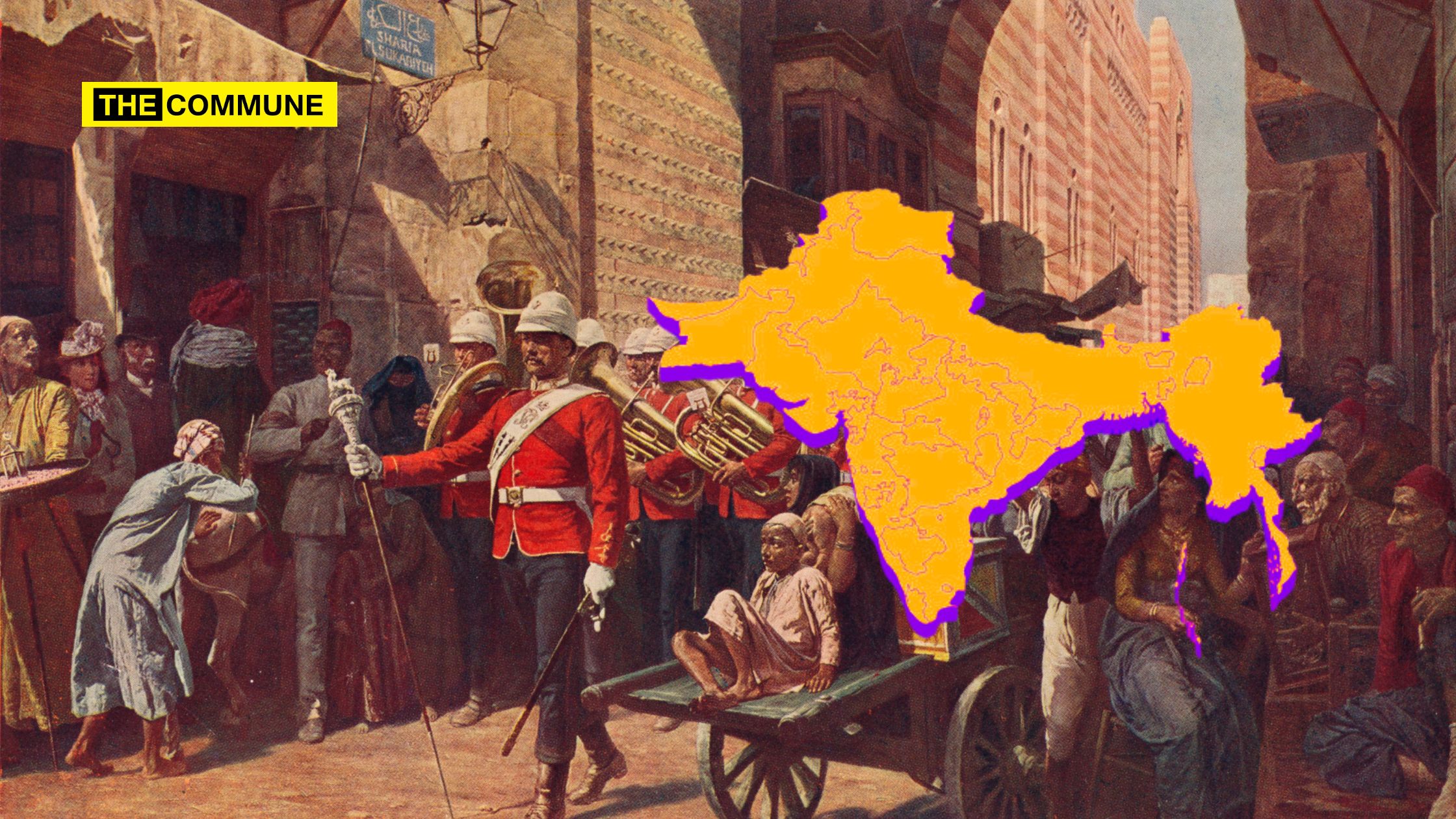
The British Empire, at its zenith, was the largest in history, and it played a significant role in shaping the modern world. One of the ways the British Empire expanded its influence was through the exploitation of global trade. The British used their power to buy valuable commodities from other countries, often at the expense of the local populations. This article delves into the exploitation of global trade by the British Empire, focusing on their acquisition of tea from China and their exploitation of India’s resources and labour.
The British Tea Heist From China
One of the most significant stories of British exploitation was their acquisition of tea from China. Initially, tea was a luxury item in Britain, introduced by Portuguese and Dutch traders in the 1600s. By the early 1700s, the British East India Company began importing tea directly from China. Tea was heavily taxed, making it expensive, and thus, it was primarily consumed by the wealthy. However, by the mid-1700s, tea had become immensely popular across all levels of British society.
The burgeoning demand for tea created a trade imbalance between Britain and China. The Chinese needed payment in silver for their tea, which drained British silver reserves. To address this imbalance, the British East India Company started growing and processing opium in Bengal, India, to smuggle it into China illegally. This led to massive addiction problems in China, which significantly weakened the Chinese economy and society.
The Chinese government’s efforts to suppress the opium trade culminated in the First Opium War (1839-1842). Britain’s victory in this war forced China to cede Hong Kong to the British, open five ports to foreign trade, and relax restrictions on foreign access to inland China, which considerably affected China’s economy. The Second Opium War (1856-1860) further solidified British control, allowing even greater exploitation.
Corporate Espionage And Tea Cultivation In India
To further their tea interests, the British engaged in a bold act of corporate espionage. In 1848, botanist Robert Fortune disguised himself and ventured into China’s interior, then forbidden to foreigners, to steal the secrets of tea horticulture and manufacturing. By smuggling tea plants and seeds out of China, the British were able to set up a thriving tea industry in India, particularly in Assam and Darjeeling. This move reduced their dependency on Chinese tea and allowed them to dominate the tea market.
India, often referred to as the “jewel in the crown” of the British Empire, was subjected to extensive exploitation of its resources and labour. The colonial exploitation of India had far-reaching effects on the country’s economy and society.
The British enforced trade policies that transformed India into an exporter of primary products like raw materials and foodstuffs while turning it into an importer of British manufactured goods. This caused a significant drain of wealth from India to Britain. Indian raw materials like cotton, indigo, and jute were exported to Britain, where they were processed into finished goods and then sold back to India at unaffordable prices.
The “wealth drain” theory, popularized by Indian nationalists like Dadabhai Naoroji, highlighted how colonial policies led to a continuous outflow of wealth from India to Britain. This was achieved through various mechanisms, including taxation, trade imbalances, and the requirement that India pay for the expenses of the British administration and military.
British capital invested in India was aimed at maximizing profits through malpractices. The colonial administration redirected a major part of the profits to Britain in the form of dividends and other charges, burdening the Indian economy. Railways, plantations, and other infrastructure projects ostensibly helped India, but they were primarily focused on serving British economic interests.
Agricultural Transformation And Exploitation
The British focused on maximizing revenue through various land revenue systems, such as the Permanent Settlement, Ryotwari, and Mahalwari systems. These policies led to the commercialization of agriculture and the exploitation of Indian peasants.
Permanent Settlement (1793): Introduced in Bengal, this system fixed land revenue permanently and made zamindars (landowners) responsible for collecting it. This led to a rigid and oppressive system where peasants were often exploited by zamindars.
Ryotwari System: Implemented in parts of South India, this system made individual peasants (ryots) solely responsible for land revenue payments to the government. While it cut the mediators, it also subjected peasants to heavy taxation.
Mahalwari System: Introduced in parts of North India, this system involved revenue collection through village communities or estates (mahals). Although it aimed at collective responsibility, it often led to the exploitation of peasants by village heads.
The British policies transformed Indian agriculture into a cash crop economy, focusing on the production of crops like indigo, opium, and cotton, often at the expense of subsistence farming. This caused widespread poverty, agricultural decline, and recurring famines, such as the Bengal Famine of 1770 and the Great Famine of 1876-78.
Deindustrialization And Impact On Traditional Industries
The British policies led to deindustrialization in India, turning the country into a raw material supplier and a market for British industrial goods. Traditional industries in India, especially textiles, suffered enormously due to competition from British manufactured goods.
Textile Industry: India had a thriving textile industry before British colonization. The British disrupted this industry by flooding the Indian market with cheaper, machine-made textiles from Britain. This led to the decline of India’s handloom weaving industry and caused economic hardship for millions of artisans and weavers.
Craft Industries: Other traditional craft industries, such as metalwork, pottery, and woodworking, also faced decline due to the influx of British goods and the focus on raw material exports.
Labor Exploitation And Social Impact
Indian labourers and artisans faced harsh conditions, low wages, and bonded labour imposed by the British. Native craftsmen were forced to sell their goods at prices decided by British agents, worsening their plight. The British also implemented systems of indentured labour, where Indian labourers were sent to work on plantations in British colonies like the Caribbean, Fiji, and Mauritius under harsh conditions.
India had to cover the costs of British administration, military expenditures, and wars conducted by the British Government. These expenses, referred to as “Home Charges,” added a significant financial burden on India’s economy. Various estimates suggest that a substantial part of India’s revenue was diverted to Britain for these purposes, further draining the resources of the Indian subcontinent.
The prolonged exploitation by the British had severe economic and social impacts on India. The wealth drain, deindustrialization, and commercialization of agriculture led to widespread poverty, recurring famines, and a stagnant economy. The traditional industries declined, and the social fabric of the country was disrupted, creating a legacy of economic disparity that affected India’s development for decades.
The exploitation also fostered resentment and resistance among the Indian population, leading to movements for independence. The Indian National Congress, formed in 1885, became a pivotal organization in the struggle for India’s freedom, culminating in India’s independence in 1947.
The British Empire exploited global trade for centuries through strategic trade policies, military conquests, and resource extraction. Their actions in China and India exemplified the extent of their exploitation, leaving a lasting impact on global trade and the economies of the colonized nations. The opium trade, tea heist, and colonial policies in India were central to their imperial success, enriching Britain at the expense of other societies. The legacy of this exploitation is still a topic of historical and contemporary significance, reminding us of the far-reaching impacts of colonialism and the importance of fair and just trade practices in the modern world.
Ganesh Kumar is a geo-political analyst.
Subscribe to our channels on Telegram, WhatsApp, and Instagram and get the best stories of the day delivered to you personally.




